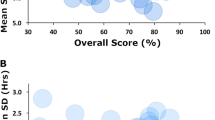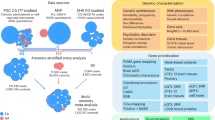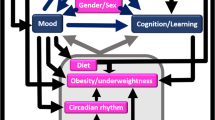Abstract
Background
The dual-factor model of mental health (i.e., the presence of psychological well-being along with the absence of distress) and its association with academic performance over time has been barely studied in the adolescent population, as most of the prior research focuses on psychological well-being or distress indicators in isolation. The current study analyzed the bidirectional longitudinal association between the dual-factor model of mental health and academic performance in adolescents, comprising a longitudinal assessment 2 years apart.
Methods
A total of 266 secondary school students (13.9 ± 0.3 years at baseline) from Deporte, ADOlescencia y Salud study were assessed. Mental health was assessed through the Behavior Assessment System for Children and Adolescents. Academic performance was assessed through academic grades and the Test of Educational Abilities. A cross-lagged modeling approach was used to examine the bidirectional longitudinal association between mental health and academic performance.
Results
Higher academic performance at baseline was associated with better mental health over time, but not vice versa, since this association was not bidirectional.
Conclusion
Results suggest that academic performance is an important target for developing educational interventions, as it shapes adolescents’ mental health at 2 years of follow-up.
Impact
-
The overall picture of students’ mental health and academic performance was analyzed.
-
Academic performance may be a predictor of adolescents’ mental health status.
-
Mental health may not be a predictor of adolescents’ academic performance.
-
Good mental health should be promoted among youth with low academic performance.
This is a preview of subscription content, access via your institution
Access options
Subscribe to this journal
Receive 14 print issues and online access
$259.00 per year
only $18.50 per issue
Buy this article
- Purchase on Springer Link
- Instant access to full article PDF
Prices may be subject to local taxes which are calculated during checkout


Similar content being viewed by others
Data availability
The datasets analyzed in the current study are available from the authors on reasonable request.
References
Benton, T. D., Boyd, R. C. & Njoroge, W. F. M. Addressing the global crisis of child and adolescent mental health. JAMA Pediatr. 175, 1108–1110 (2021).
Kessler, R. C. et al. Lifetime prevalence and age-of-onset distributions of DSM-IV disorders in the national comorbidity survey replication. Arch. Gen. Psychiatry 62, 593–602 (2005).
Costello, E. J. & Maughan, B. Annual research review: optimal outcomes of child and adolescent mental illness. J. Child Psychol. Psychiatry Allied Discip. 56, 324–341 (2015).
Patel, V., Flisher, A. J., Hetrick, S. & McGorry, P. Mental health of young people: a global public-health challenge. Lancet 369, 1302–1313 (2007).
Agnafors, S., Barmark, M. & Sydsjö, G. Mental health and academic performance: a study on selection and causation effects from childhood to early adulthood. Soc. Psychiatry Psychiatr. Epidemiol. 56, 857–866 (2021).
Antaramian, S. P., Scott Huebner, E., Hills, K. J. & Valois, R. F. A dual-factor model of mental health: toward a more comprehensive understanding of youth functioning. Am. J. Orthopsychiatry 80, 462–472 (2010).
Amholt, T. T., Dammeyer, J., Carter, R. & Niclasen, J. Psychological well-being and academic achievement among school-aged children: a systematic review. Child Indic. Res. 13, 1523–1548 (2020).
Riglin, L., Petrides, K. V., Frederickson, N. & Rice, F. The relationship between emotional problems and subsequent school attainment: a meta-analysis. J. Adolesc. 37, 335–346 (2014).
King, N., Davison, C. M. & Pickett, W. Development of a dual-factor measure of adolescent mental health: an analysis of cross-sectional data from the 2014 Canadian Health Behaviour in School-aged Children (HBSC) study. BMJ Open 11, e041489 (2021).
Rothon, C. et al. The impact of psychological distress on the educational achievement of adolescents at the end of compulsory education. Soc. Psychiatry Psychiatr. Epidemiol. 44, 421–427 (2009).
Almroth, M. C., László, K. D., Kosidou, K. & Galanti, M. R. Association between adolescents’ academic aspirations and expectations and mental health: a one-year follow-up study. Eur. J. Public Health 28, 504–509 (2018).
Wu, X., Gai, X. & Wang, W. Subjective well-being and academic performance among middle schoolers: a two-wave longitudinal study. J. Adolesc. 84, 11–22 (2020).
Bortes, C., Ragnarsson, S., Strandh, M. & Petersen, S. The bidirectional relationship between subjective well-being and academic achievement in adolescence. J. Youth Adolesc. 50, 992–1002 (2021).
Ng, Z. J., Huebner, S. E. & Hills, K. J. Life satisfaction and academic performance in early adolescents: evidence for reciprocal association. J. Sch. Psychol. 53, 479–491 (2015).
Steinmayr, R., Crede, J., McElvany, N. & Wirthwein, L. Subjective well-being, test anxiety, academic achievement: testing for reciprocal effects. Front. Psychol. 6, 1994 (2016).
Van Der Ende, J., Verhulst, F. C. & Tiemeier, H. The bidirectional pathways between internalizing and externalizing problems and academic performance from 6 to 18 years. Dev. Psychopathol. 28, 855–867 (2016).
Zhang, W., Zhang, L., Chen, L., Ji, L. & Deater-Deckard, K. Developmental changes in longitudinal associations between academic achievement and psychopathological symptoms from late childhood to middle adolescence. J. Child Psychol. Psychiatry 60, 178–188 (2019).
Selig, J. P. & Little, T. D. Autoregressive and cross-lagged panel analysis for longitudinal data. In Handbook of Developmental Research Methods (eds Laursen, B. P., Little, T. D. & Card, N. A.) 265–278 (New York, Guilford Press, 2012).
González, J., Fernández, S., Pérez, E. & Santamaría, P. Adaptación española del sistema de evaluación de la conducta en niños y adolescentes: BASC (Madrid, TEA Ediciones, 2004).
Reynolds, C. R. & Kamphaus, R. W. Behavior Assessment System for Children 2nd edn (Circle Pines, MN, USA, AGS Publishing, 2004).
Thurstone, L. & Thurstone, T. TEA Test de Aptitudes Escolares Vol. 77 (Madrid, Scholar Aptitudes Test, 2004).
Ortega, F. B. et al. Health-related physical fitness according to chronological and biological age in adolescents. The AVENA study. J. Sports Med. Phys. Fit. 48, 371–379 (2008).
Reiss, F. Socioeconomic inequalities and mental health problems in children and adolescents: a systematic review. Soc. Sci. Med. 90, 24–31 (2013).
Rao, W. W. et al. Obesity increases the risk of depression in children and adolescents: results from a systematic review and meta-analysisTitle. J. Affect Disord. 267, 78–85 (2020).
Donnelly, J. E. et al. Physical activity, fitness, cognitive function, and academic achievement in children: a systematic review. Med. Sci. Sports Exerc. 48, 1197–1222 (2016).
Santana, C. C. A., Hill, J. O., Azevedo, L. B., Gunnarsdottir, T. & Prado, W. L. The association between obesity and academic performance in youth: a systematic review. Obes. Rev. 18, 1191–1199 (2017).
He, J., Chen, X., Fan, X., Cai, Z. & Huang, F. Is there a relationship between body mass index and academic achievement? A meta-analysis. Public Health 167, 111–124 (2019).
Tanner, J. M. & Whitehouse, R. H. Clinical longitudinal standards for height, weight, height velocity, weight velocity, and stages of puberty. Arch. Dis. Child 51, 170–179 (1976).
Currie, C. et al. Researching health inequalities in adolescents: The development of the Health Behaviour in School-Aged Children (HBSC) Family Affluence Scale. Soc. Sci. Med. 66, 1429–1439 (2008).
Rosseel, Y. Lavaan: an R package for structural equation modeling. J. Stat. Softw. 48, 1–36 (2012).
Vitezova, A. et al. Bidirectional associations between circulating vitamin D and cholesterol levels: the Rotterdam study. Maturitas 82, 411–417 (2015).
Benjamini, Y. & Hochberg, Y. Controlling the false discovery rate: a practical and powerful approach to multiple testing. J. R. Stat. Soc. Ser. B 57, 289–300 (1995).
Anderman, L. H. Academic and social perceptions as predictors of change in middle school students’ sense of school belonging. J. Exp. Educ. 72, 5–22 (2003).
Fong Lam, U., Chen, W. W., Zhang, J. & Liang, T. It feels good to learn where I belong: school belonging, academic emotions, and academic achievement in adolescents. Sch. Psychol. Int. 36, 393–409 (2015).
Eccles, J. S. Schools, academic motivation, and stage-environment fit. In Handbook of Adolescent Psychology 2nd edn (eds Lerner, R. M. & Steinberg, L.) 404–434 (John Wiley and Sons, 2013).
Dapp, L. C. & Roebers, C. M. Metacognition and self-concept: elaborating on a construct relation in first-grade children. PLoS One 16, e0250845 (2021).
Veldman, K., Reijneveld, S. A., Ortiz, J. A., Verhulst, F. C. & Bültmann, U. Mental health trajectories from childhood to young adulthood affect the educational and employment status of young adults: results from the TRAILS study. J. Epidemiol. Community Health 69, 588–593 (2015).
Baker, J. A. Contributions of teacher-child relationships to positive school adjustment during elementary school. J. Sch. Psychol. 44, 211–229 (2006).
Clarke, A. M., Kuosmanen, T. & Barry, M. M. A systematic review of online youth mental health promotion and prevention interventions. J. Youth Adolesc. 44, 90–113 (2015).
Petrides, K. V., Chamorro-Premuzic, T., Frederickson, N. & Furnham, A. Explaining individual differences in scholastic behaviour and achievement. Br. J. Educ. Psychol. 75, 239–255 (2005).
Lê-Scherban, F., Diez Roux, A. V., Li, Y. & Morgenstern, H. Does academic achievement during childhood and adolescence benefit later health? Ann. Epidemiol. 24, 344–355 (2014).
Pan, L., Sherry, B., Park, S. & Blanck, H. M. The association of obesity and school absenteeism attributed to illness or injury among adolescents in the United States, 2009. J. Adolesc. Health 52, 64–69 (2013).
Funding
The DADOS study was supported by the Ministry of Economy and Competitiveness (DEP2013-45515-R) and the Universitat Jaume I (P1·1A2015-05, UJI-B2018-40, UJI-A2019-12, and UJI-A2022-02). This work is partly supported by a Sunny Sport research grant from the Schweppes Suntory Spain Company. In addition, M.R.-A. is supported by the Ramon Areces Foundation and I.M.-C. is supported by a predoctoral fellowship from the Ministry of Education and Vocational Training of Spain (FPU19/02462).
Author information
Authors and Affiliations
Contributions
D.M.-U. conceived the design of DADOS study. I.M.-C., M.A.-R., and D.M.-U. were involved in the data collection. I.M.-C. and M.R.-A. performed the initial idea, the design, the statistical analyses, and the interpretation of the data. I.M.-C. wrote the first draft of the manuscript and all authors contributed to, reviewed, and approved the final version.
Corresponding author
Ethics declarations
Competing interests
The authors declare no competing interests.
Ethics approval and consent to participate
Adolescents and their parents or guardians were informed of the nature and characteristics of DADOS study, and all provided written informed consent. In addition, the protocol of DADOS study was designed in accordance with the ethical guidelines of the Declaration of Helsinki 1964 (last revision of Fortaleza, Brazil, 2013) and approved by the Research Ethics Committee of Universitat Jaume I of Castellon (Spain).
Additional information
Publisher’s note Springer Nature remains neutral with regard to jurisdictional claims in published maps and institutional affiliations.
Supplementary Information
Rights and permissions
Springer Nature or its licensor (e.g. a society or other partner) holds exclusive rights to this article under a publishing agreement with the author(s) or other rightsholder(s); author self-archiving of the accepted manuscript version of this article is solely governed by the terms of such publishing agreement and applicable law.
About this article
Cite this article
Monzonís-Carda, I., Rodriguez-Ayllon, M., Adelantado-Renau, M. et al. Bidirectional longitudinal associations of mental health with academic performance in adolescents: DADOS study. Pediatr Res (2023). https://doi.org/10.1038/s41390-023-02880-z
Received:
Revised:
Accepted:
Published:
DOI: https://doi.org/10.1038/s41390-023-02880-z



